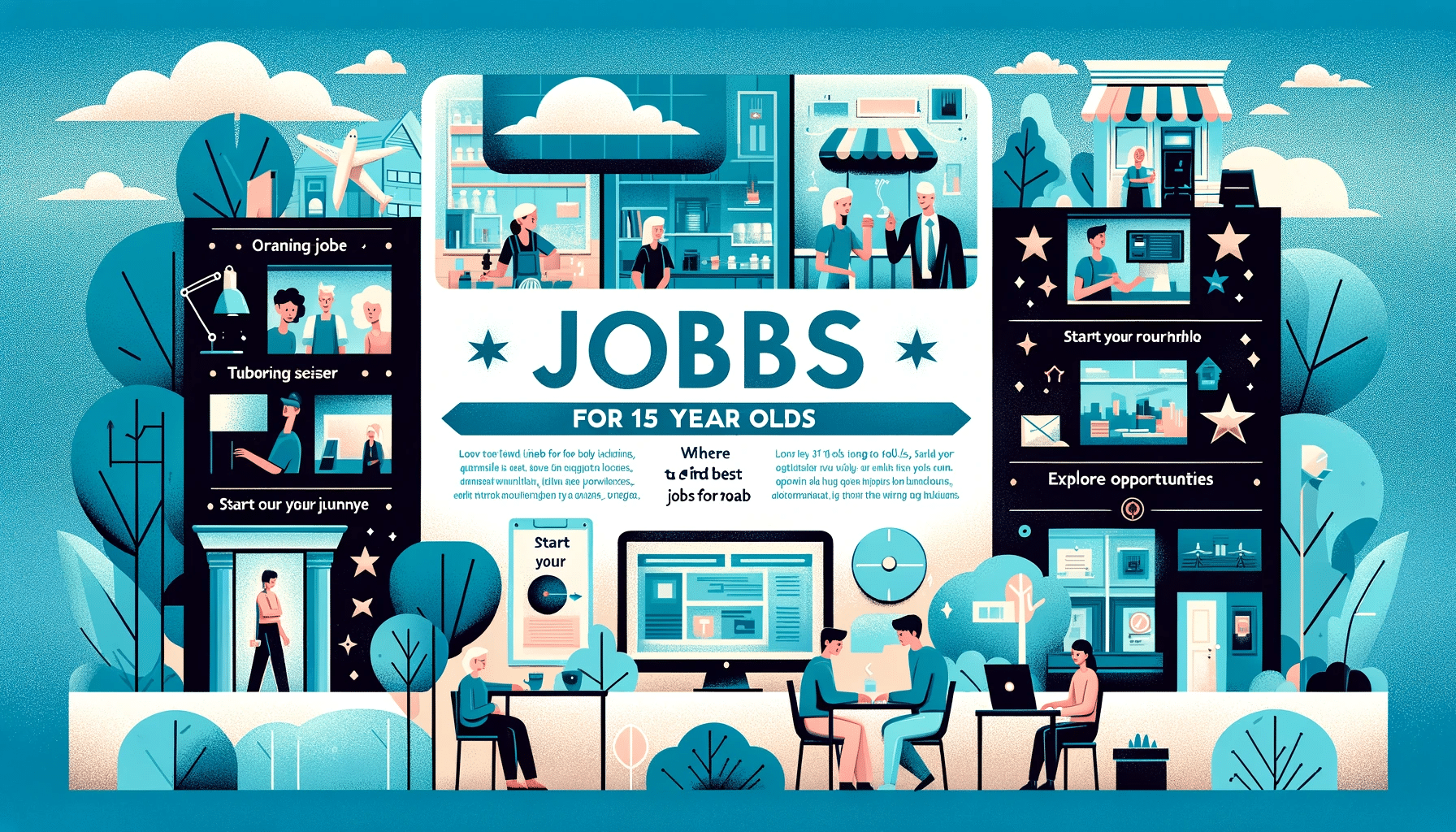Are you a 15-year-old thinking about stepping into the workforce? The world of work offers a plethora of opportunities for young individuals like you, eager to explore, learn, and earn. In fact, according to the U.S. Bureau of Labor Statistics, a significant number of teenagers are actively engaged in part-time or summer jobs. This early foray into the working world is more than just about earning some extra pocket money; it’s a foundational step towards building a robust work ethic, gaining practical skills, and understanding the value of money.
Navigating the job market at 15 can be both exciting and daunting. While certain restrictions exist regarding the type of work and hours due to child labor laws, there are still ample opportunities in various sectors. From traditional roles like babysitting and retail to more modern gigs such as social media management or online tutoring, the options are diverse. These jobs not only provide a source of income but also serve as a platform to develop essential life skills, including responsibility, time management, and interpersonal communication.
Embarking on this journey requires understanding what jobs are available, how to find them, and the legalities involved in working at a young age. This guide aims to provide a comprehensive overview of job opportunities for 15-year-olds, offering insights into finding the right job and making the most of this early work experience. Remember, your first job is more than just a paycheck; it’s the first step in a lifelong journey of professional growth and personal development.
We’re honored to have Roshan with us today, bringing over 11 years of experience in the field. Renowned for their expertise in tackling specific challenges, Roshan offers a unique perspective shaped by their extensive qualifications and real-world experiences. Their insights are sure to be invaluable and enlightening.
Understanding the Legal Framework

Did you know that the rules for working teens are not just about what job you can do, but also when and how long you can work? Navigating the legal landscape is a crucial first step for any 15-year-old eager to enter the workforce. The U.S. Department of Labor, along with state governments, has set specific guidelines to ensure the safety and well-being of young workers.
For 15-year-olds, federal child labor laws stipulate clear boundaries. You’re generally not allowed to work in hazardous industries, and there are limits on working hours to ensure it doesn’t interfere with your education. During the school year, you can’t work more than 3 hours on a school day or 18 hours in a school week. In the summer, these limits increase, allowing you to work up to 8 hours a day and 40 hours a week. Moreover, there are restrictions on late-night shifts to protect your health and academic commitments.
However, these regulations can vary from state to state. Some states require work permits or age certificates for teenagers seeking employment. These permits often involve getting consent from your parents and school, ensuring that your job doesn’t negatively impact your schooling. It’s essential to check your state’s specific laws and obtain any necessary documentation before starting your job hunt. Remember, these laws are in place to support and protect you as you take this exciting step toward independence and responsibility.
Top Job Opportunities for 15-Year-Olds
Wondering what job opportunities are out there for a 15-year-old like you? The good news is, there are several industries eager to welcome young, enthusiastic workers. Whether it’s your first step into the working world or a chance to explore different career paths, these jobs offer valuable experience and skills development.
Retail Jobs:
- Sales Associate: Engage with customers, assist in product selection.
- Merchandise Stocker: Organize and restock shelves, manage inventory.
- Grocery Bagger: Assist customers by bagging groceries and providing service at checkout.
Food Service Jobs:
- Kitchen Helper: Assist in meal prep and maintain kitchen cleanliness.
- Bakery Assistant: Help in baking and decorating, manage display counters.
- Dining Room Attendant: Set tables, assist in maintaining a clean dining area.
Recreation and Entertainment Jobs:
- Community Center Assistant: Help in organizing events and managing facilities.
- Sports Facility Attendant: Assist in equipment management and facility upkeep.
- Library Aide: Help in organizing books, assist patrons, and manage reading areas.
Outdoor Jobs:
- Gardening Assistant: Help in lawn care, planting, and maintaining gardens.
- Car Wash Attendant: Assist in washing and detailing vehicles.
- Golf Caddy: Assist golfers, manage equipment, and learn about the sport.
Creative and Tech Jobs:
- Social Media Assistant: Help businesses with their social media presence.
- Junior Graphic Designer: Assist in creating basic designs and layouts.
- Website Content Contributor: Write articles or blog posts for websites.
Babysitting and Pet Sitting:
- Child Care Assistant: Help in daycares or family settings with child care.
- Pet Care Helper: Assist in pet sitting, walking, and basic grooming.
Tutoring and Academic Assistance:
- Peer Tutor: Assist fellow students in subjects you excel in.
- Homework Club Helper: Aid younger students in after-school homework clubs.
Volunteer and Internship Opportunities:
- Non-Profit Volunteer: Gain experience in various roles within charitable organizations.
- Intern at Local Businesses: Learn about different industries through internships.
Each of these roles offers unique learning experiences and skill development opportunities. They can serve as a stepping stone to understanding work ethics, responsibility, and the value of earning. It’s important to choose a job that not only fits your schedule but also aligns with your interests and future aspirations.
How to Find Jobs: A Step-by-Step Guide
Are you ready to dive into the job market but not sure where to start? Finding a job as a teenager can seem overwhelming, but with the right approach, it can be a smooth and successful journey. A survey by the Pew Research Center reveals that 30% of teens have worked in some capacity, indicating a vibrant job market for young individuals.
Local Job Search Strategies: Start by exploring your local community. Many businesses like grocery stores, cafes, and retail shops often welcome young workers. Keep an eye out for “Help Wanted” signs in windows or community bulletin boards. Don’t hesitate to walk in and inquire directly about job opportunities. Local newspapers and community centers can also be valuable resources for finding job listings in your area.
Online Job Platforms and Resources: The digital age has made job hunting more accessible. Websites like Indeed, Snagajob, and Monster offer dedicated sections for part-time and entry-level jobs suitable for teenagers. Additionally, platforms like LinkedIn can be used to create a professional profile that showcases your skills and interests. Remember to stay safe online and verify the legitimacy of job offers.
Networking and Word-of-Mouth: Never underestimate the power of networking. Talk to family members, friends, teachers, or coaches who might know about job openings. Word-of-mouth can often lead to opportunities that aren’t advertised publicly. Engaging in community events, volunteer work, or local clubs can also expand your network and increase your chances of finding a job.
Embarking on your job search journey can be an exciting venture. With a blend of local exploration, online resources, and networking, you’ll be well on your way to landing a great job. Remember, persistence and a positive attitude are key to unlocking opportunities.
Preparing for Your Job Application

Are you feeling a bit anxious about preparing your first job application? You’re not alone. Many young job seekers face the challenge of showcasing their abilities despite limited work experience. Remember, everyone starts somewhere, and your enthusiasm and willingness to learn can be your greatest assets.
Crafting a Resume with Limited Experience: Your resume is your chance to make a good first impression. Focus on your strengths and any relevant experiences, like volunteer work, school projects, or extracurricular activities. Highlight skills such as teamwork, communication, and any specific talents related to the job. If you’ve taken any courses or workshops, include those too. The key is to show potential employers that you have qualities that can contribute to their team, even if you haven’t had a formal job before.
Writing a Compelling Cover Letter: A cover letter is your opportunity to tell your story. Use it to explain why you’re interested in the job and how it aligns with your goals or interests. Be genuine and express your eagerness to learn and grow. Tailor each cover letter to the specific job you’re applying for, showing that you’ve done your homework about the company or role.
Tips for Filling Out Job Applications: When filling out applications, be thorough and accurate. Double-check for any spelling or grammatical errors. If there are questions you’re unsure about, it’s okay to ask a parent, teacher, or mentor for advice. Be honest in your responses and provide as much detail as the application allows, keeping in mind the skills and experiences you listed in your resume.
Preparing your job application is an important step in your job search journey. It’s your chance to showcase your potential and enthusiasm. With a well-crafted resume and cover letter, and a carefully filled-out application, you’ll be ready to take the next step towards your first job.
Acing the Job Interview
Got an interview lined up for your first job? That’s fantastic! Interviews can be nerve-wracking, but with the right preparation, you can turn it into a positive and successful experience. Remember, an interview is as much about your personality and enthusiasm as it is about your skills and experiences.
Common Interview Questions and Effective Responses: Be prepared to answer questions like “Why do you want to work here?” or “What are your strengths and weaknesses?” For the first question, research the company and express how its values align with yours. When discussing strengths, focus on qualities like your eagerness to learn, reliability, or teamwork skills. For weaknesses, choose something you’re actively working to improve and explain how. For example, “I sometimes get nervous speaking in front of groups, but I’m working on it by participating more in class discussions.”
Dressing for Success: First impressions matter, so dress appropriately for the job you’re applying for. If it’s a casual workplace, neat and clean casual wear is fine. For more formal settings, opt for a more polished look. The key is to look tidy and professional.
Interview Etiquette and Follow-Up: During the interview, be polite, listen carefully, and answer questions thoughtfully. After the interview, sending a thank-you email or note is a great way to show your appreciation and reiterate your interest in the job. It leaves a lasting positive impression.
Balancing Work and School

Juggling school and a part-time job can feel like walking a tightrope, can’t it? It’s all about finding that sweet spot where you can excel in both without burning out. According to a study by the Bureau of Labor Statistics, high school students who work 10 to 15 hours per week have higher levels of future career success. However, the key lies in balancing work with academic responsibilities effectively.
Time Management Tips for Student Workers: Effective time management is crucial. Start by creating a weekly schedule that includes school, work hours, homework, and relaxation time. Use tools like planners or apps to keep track of assignments and work shifts. Prioritize tasks and set realistic goals for each day. Remember, it’s okay to say no to extra shifts if you have important schoolwork to focus on.
Setting Priorities and Boundaries: Your education should remain a top priority. Communicate with your employer about your school schedule and upcoming exams to ensure they understand your availability. Likewise, let your teachers know about your job and how you’re managing your time. They can offer support and advice, especially during busy periods.
The Importance of Maintaining Academic Performance: While work experience is invaluable, maintaining good grades is equally important. It opens doors to future educational opportunities and scholarships. If you find your job is taking a toll on your schoolwork, it might be time to reassess your work hours or seek a job with more flexible scheduling.
Balancing work and school is a skill that will benefit you throughout life. With careful planning and clear communication, you can successfully manage both and set the foundation for a bright future.
Safety and Rights at Work
Did you know that as a young worker, you have specific rights designed to protect you in the workplace? It’s not just about earning a paycheck; it’s also about ensuring your safety and well-being while on the job. The Occupational Safety and Health Administration (OSHA) reports that younger workers are twice as likely to be injured at work compared to older employees, mainly due to lack of experience and awareness of their rights.
Understanding Workplace Safety: Safety at work is paramount. Familiarize yourself with the safety protocols of your workplace. This includes understanding how to use equipment safely, knowing the emergency procedures, and wearing the necessary protective gear. Don’t hesitate to ask for training if you feel unsure about a task. Remember, it’s your right to have a safe working environment.
Knowing Your Rights as a Young Worker: As a young worker, you’re entitled to fair labor practices. This includes receiving at least the minimum wage, getting paid for overtime work, and working in a non-hazardous environment. Be aware of the labor laws in your state, as they can vary. If something doesn’t feel right, it probably isn’t.
Handling Workplace Challenges: If you encounter challenges such as unfair treatment, safety concerns, or harassment, it’s important to speak up. Talk to a trusted adult, a supervisor, or a human resources representative. You can also contact labor rights organizations if you need further assistance.
Understanding your rights and maintaining safety at work are crucial aspects of your job. By staying informed and vigilant, you can ensure a positive and safe work experience. Remember, your safety and rights are always a top priority.
Benefits of Working as a Teenager

Have you ever wondered what it would be like to earn your own money and gain real-world experience while still in your teens? Working as a teenager isn’t just about the paycheck; it’s an enriching journey that sets the foundation for your future. A survey by the National Association of Colleges and Employers highlighted that employers highly value work experience when hiring new graduates, indicating the long-term benefits of early work experience.
Gaining Valuable Work Experience: Starting a job as a teenager allows you to gain firsthand experience in the working world. It’s an opportunity to explore different career paths, understand workplace dynamics, and learn about responsibility and professionalism. This experience is invaluable, as it not only bolsters your resume but also gives you a taste of what to expect in your future career.
Developing Soft Skills: The workplace is a fantastic arena for developing soft skills. Skills like communication, teamwork, problem-solving, and time management are nurtured on the job. These are essential skills that will benefit you in every aspect of your life, academically and professionally. Working with a diverse group of people also enhances your interpersonal skills and cultural understanding.
Financial Independence and Savings: Earning your own money is empowering. It teaches you the value of money, budgeting, and saving. Financial independence at a young age fosters a sense of responsibility and can be incredibly rewarding. It also provides an opportunity to save for future goals, whether it’s college, a car, or other personal projects.
Working as a teenager is more than just a job; it’s a stepping stone to your future. It prepares you for the adult world, gives you a sense of accomplishment, and helps you understand the value of hard work and dedication.
Conclusion
Embarking on your first job search is like setting sail on an exciting voyage of self-discovery and growth. Remember, every professional, no matter how successful, started somewhere – often with a first job during their teenage years. This early step into the working world is not just about earning money; it’s about laying the groundwork for your future.
As you step into this new phase, embrace the journey with enthusiasm and an open mind. Be patient with yourself; learning and growth take time. Don’t be afraid to ask questions, seek advice, and learn from every experience, whether it’s positive or challenging. Each job, no matter how small it seems, is a building block in your career path, teaching you valuable lessons and shaping your work ethic.
The long-term benefits of starting work early are numerous. You’ll gain a head start in understanding the dynamics of the workplace, develop essential life skills, and build a foundation for financial independence. These experiences will not only enrich your resume but also enhance your personal development, making you a well-rounded individual ready to take on the world.
So, go ahead, take that first step with confidence. Your journey into the world of work is not just about what you do; it’s about who you become in the process. Remember, every big dream begins with a small step. Your first job is that step, leading you towards a future full of possibilities and success.
FAQs for 15-Year-Olds Looking for Jobs
Q1: Can I work at any type of job at 15? A1: At 15, there are certain restrictions on where and what types of jobs you can work. Generally, you’re not allowed to work in hazardous environments or industries. Jobs in retail, food service, and recreation are often suitable for 15-year-olds. Always check the specific laws in your state for more details.
Q2: How many hours am I allowed to work as a 15-year-old? A2: The number of hours you can work each week is limited to ensure it doesn’t interfere with your schooling. During the school year, you’re typically allowed to work no more than 3 hours on a school day and 18 hours in a school week. During school breaks, these limits may increase.
Q3: Do I need a work permit to get a job? A3: In some states, you’ll need a work permit or age certificate to work if you’re under 16. This usually requires permission from your parents and school. Check with your school or state labor department for specific requirements.
Q4: What should I do if I feel overwhelmed balancing school and work? A4: If your job is affecting your schoolwork or health, it’s important to reassess your schedule. Talk to your employer about reducing your hours or finding a more flexible work arrangement. Prioritizing your health and education is crucial.
Q5: How can I prepare for a job interview with no work experience? A5: Focus on your strengths, such as your willingness to learn, your school achievements, any volunteer work, and extracurricular activities. Practice answering common interview questions and be honest about your lack of experience while emphasizing your eagerness to grow and contribute.
Q6: What should I wear to a job interview? A6: Dress appropriately for the type of job you’re applying for. For most entry-level and casual jobs, neat and clean casual wear is fine. For more formal settings, dress more professionally. The key is to look tidy and presentable.
Q7: How can I find job opportunities as a 15-year-old? A7: Start by looking for “Help Wanted” signs in your local community, check online job boards that list part-time or teen-friendly jobs, and ask family and friends. Networking can often lead to job opportunities that aren’t advertised publicly.
